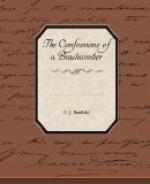For six months it may be said the prevailing wind is the south-east, followed by gentle breezes from the east and north-east. North-easters begin in September and are intermittent until the beginning of the wet season. The south-east monsoons are regular and consistent; the north-east, which precede the rainy monsoon, fitful and wayward, never continuing long in one stay, and lasting but four out of the twelve months. Rare is the wind from the west, rarer from the south-west. North-easters are a pronounced feature. They work up by diurnal and easy grades from gentleness to strength, thunder coming as a climax. After a succession of calm days and days of gentle breezes from the east-south-east and east, the north-easter begins softly, and daily gathers courage and assumption, to find in the course of a week or two its haughty spirit subdued by thunder and rain showers. Calms prevail for a few days. Easterly breezes come, to give way to the north-east again, and so the programme is repeated with variations which none may foresee, and which set at naught the lengthiest experience. At last, at Christmas or the New Year, the rains come with a boisterous beginning. A north-easter accompanied by thunder lasted a whole July afternoon. It was as strange as a crop of mangoes would have been at that time of year.
During the cool season—a generous half of the year—dews are common—not the trivial barely perceptible moisture called dew in some parts, but most ungentle dew, which saturates everything and drips from the under sides of verandahs as the sun warms the air; dew which bows the grass with its weight, soaks through your dungarees to the hips, and soddens your thick bluchers, until you feel and appear as though you had waded through a swamp; dew which releases the prisoned odour of flowers irresponsive to the heat of the sun, which keeps the night cool and sweet, which with the first gleam of the sun makes the air soft and spicy and buoyant, and inspires thankfulness for the joy of life.
Are we not all apt to fall into the error of estimating the character of a country by its extravagances rather than its average and general qualities?
North Queensland has the reputation of being the home of malaria and the special sport of any cyclone that may have mischief in view. Being tropical, we have malaria, but it is of no more serious consequence than any one of the ills to which human flesh is heir in temperate climes. It does not exact such a toll of suffering and death as influenza, nor as typhoid used to do in crowded cities; nor is it as common as rheumatism in damp and blustering New Zealand, where the thermometer ranges from 100 deg. in the shade to 24 deg. of frost. Malaria touches us lightly, and it is chosen as a bugbear with which to scare people away. A southern critic, honestly pitiful of our ill state, urges that the experiment of destroying those mosquitoes which disseminate the germ of malaria,




